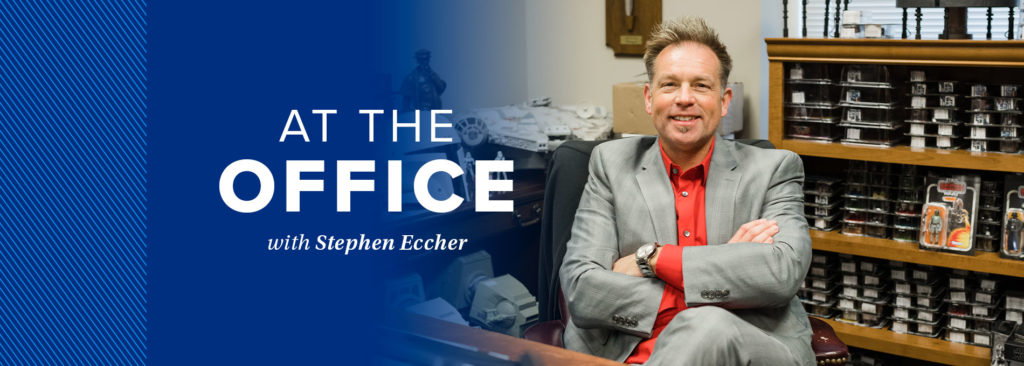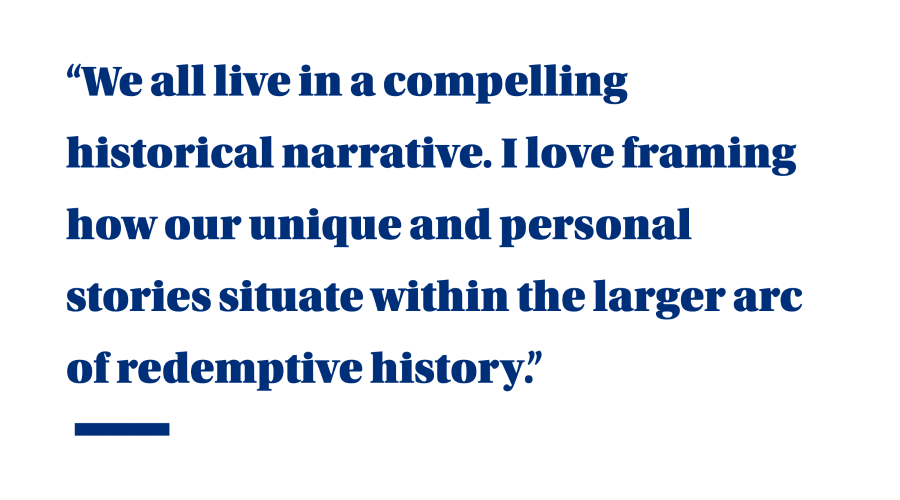At the Office with Dr. Stephen Eccher
Lauren Pratt | July 06, 2021

For Stephen Eccher, Associate Professor of Church History and Reformation Studies, picking his favorite Reformer is like picking his favorite child (or Star Wars character, for that matter).
It’s just not possible. But it’s clear from his office that he resonates with the Swiss Reformer Ulrich Zwingli. Enclosed in a case on one of his bookshelves is a first edition 1525 pamphlet with Zwingli’s reply to Balthasar Hubmaier on a discussion about baptism, which he purchased in Zurich during the 500th anniversary of the Reformation. Eccher’s shelves are an eclectic mix of historic Reformation reads and memorabilia, as well as Star Wars action figures, vinyl records, a signed football by Walter Peyton, encased Jordans, and more.
In a recent conversation, Dr. Eccher discussed a variety of topics from his favorite type of music to the intersection of the Great Commission and Church History.
Check out the conversation below.
If you had to say what you appreciate about one of the Reformers, say Ulrich Zwingli, what would it be?
I think just the uniqueness of his story, to think of somebody who helped to establish a theological tradition, who helped to develop a particular view on the supper that Baptists adhere to, but also to have been a guy who died on the battlefield with a sword in his hand. He does equally amazing things just as he does horrific and awful things. He’s a human being, like all of us.
What’s your favorite kind of music?
I love classical, I love punk, I love disco, I love rock, I love the 80s, the 70s and the 60s. Anything except country. That’s the bane of my existence. If I hit shuffle on my phone, you’re going to get the Ramones playing punk and then the next thing will be Lionel Richie or Pavarotti. It just goes all over the place.
What shows are you currently watching?
Right now, I’m watching Star Wars, the Bad Batch, and Clone Wars with my daughters for the second time around. They all love it.
What do you enjoy doing for fun?
I’m a gym rat so I usually work out every day. For me, it just clears my mind. I’m usually watching shows or movies at the gym when I’m working out. Although I’m an avid indoorsman, I do also like to just relax out back by the pool with my kids.
What is your favorite class you teach here and why? 
My favorite classes to teach are either the upper level MDiv elective on the Reformation or my PhD seminar on the Reformation. I’m endlessly fascinated by the 16th century—the people, the movements, the controversies, the way in which so much of that era continues to shape and inform what we do today.
When did you decide you wanted to study Church History?
Probably my third or fourth year in seminary. I had originally thought about doing Old Testament. Then I thought about doing theology, Patristics studies, and then just naturally gravitated toward the Reformers. I found them to be an endless sea of complexity. That era and Reformation studies in general just resonated with me.
Did you think you’d be teaching it?
I had hopes to. Part of the reason for going to the UK for my PhD was to give myself the opportunity to steep in a different context and to study at the Reformation Studies Institute—to actually go someplace where all they were doing was studying the Reformation and to do it in a place where the Reformation happened. During my Master of Letters and my PhD years, I would regularly go and sit in the ruins of St. Andrew’s castle, which is where the Scottish Reformer John Knox was first called to preach.
What is your favorite Martin Luther quote?
Probably “We are beggars.” He said it on his deathbed. He said it in response to the question, “Was the Reformation worth it? Would he stand by his teachings?” I love how the quote reminds us of our humanity and the hope of the gospel–that we were dead in our sins, and God through Christ came and made us alive by his grace through faith alone.
How does Church History inform how students fulfill the Great Commission?
I try to teach my classes based on three questions: I ask all my students to consider what they believe? Why they believe those things? And what are they willing to give up or sacrifice for those beliefs? Church history helps us to understand our confessional heritage and helps us to understand how we read the Bible. For instance, the Reformation informs how we present the gospel. We’re not going to the nations to introduce the saving power of the Eucharist; we’re going to try to share about the transforming power of Christ and the gospel; that God has and is redeeming for himself a people by means of the Son’s redemptive work. We all live in a compelling historical narrative. I love framing how our unique and personal stories situate within the larger arc of redemptive history. To consider the way in which other people’s stories and our lives have been changed by the transforming power of the gospel is pretty powerful.
*This article has been edited for length and clarity.
